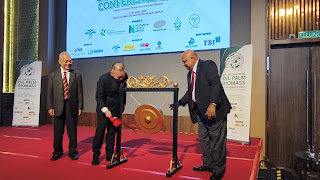Malaysia Strengthens Global Position in Biomass Sector at 5th International Oil Palm Biomass Conference
Malaysia Strengthens Global Position in Biomass Sector at 5th International Oil Palm Biomass Conference
KUALA LUMPUR, 14 April 2025 — Malaysia reaffirmed its commitment to renewable energy and sustainability today as YB Datuk Chan Foong Hin, Deputy Minister of Plantation and Commodities, officiated the 5th International Oil Palm Biomass Conference (IOPBC) 2025 at Berjaya Times Square Hotel. The Deputy Minister represented YB Datuk Seri Johari Abdul Ghani, Minister of Plantation and Commodities.
In his keynote address, Datuk Chan highlighted Malaysia’s growing leadership in the global biomass industry, driven largely by its robust palm oil sector and a rapidly expanding export market for biomass by-products.
“Biomass has emerged as a key driver in reducing carbon emissions and promoting a circular economy,” said Datuk Chan. “Malaysia is positioned as a major global supplier of renewable energy materials.”
Record Growth in Biomass Exports
Malaysia recorded significant growth in biomass exports in 2024. Palm kernel shell (PKS) exports reached 1.27 million tonnes, with Japan and Thailand being the primary importers for power generation. Wood pellet exports also saw a 31% increase, totaling 1.13 million tonnes, driven by heightened demand from Japan, South Korea, and the Netherlands.
“Malaysia’s biomass industry is not just about economic gains,” said Datuk Chan. “It’s about leading the transition to a cleaner, greener world.”
Biomass Success Stories
The Deputy Minister shared several success stories that showcased the practical impact of biomass initiatives. Nestlé Malaysia’s biomass boiler at its Chembong factory in Negeri Sembilan, operational since late 2023, is expected to reduce carbon emissions by 14,000 tonnes of CO₂ annually. The RM18 million project uses palm kernel shells and empty fruit bunches as fuel sources.
In East Malaysia, the Samling Group’s TreeOne Megapellet plant in Bintulu has also emerged as a key player. Despite challenges during the pandemic, the company secured biomass supply agreements with major Japanese power producers.
Strategic Policy Initiatives
Datuk Chan acknowledged the challenges faced by the industry, including high operational costs, technology gaps, and increasing global sustainability demands—particularly from the European Union.
In response, the Ministry of Plantation and Commodities has introduced several strategic initiatives:
-
National Biomass Action Plan (2023–2030) to align with Malaysia’s National Energy Transition Roadmap
-
Investments in Waste-to-Energy technologies to convert palm oil waste into renewable energy
-
Production of Sustainable Aviation Fuel (SAF), expected to commence in 2026
-
Supply Chain Integrity Enhancements through improved traceability systems led by MPOB
-
Promotion of Responsible Biomass Practices, including agroforestry and regenerative farming methods
A Call to Collaborate
With Asia accounting for an increasing share of global biomass pellet imports—up from 18% to 32% over the past five years—Malaysia is well-positioned to meet rising international demand.
“By turning biomass into economic value, we can reduce waste while supporting inclusive growth that benefits farmers, communities, and the environment,” Datuk Chan stressed.
He concluded with a call for collaboration, innovation, and commitment to sustainability. “Let us be bold in our ideas, collaborative in our efforts, and unwavering in our dedication to sustainability.”
The conference brought together researchers, policymakers, industry leaders, and innovators from across the globe, aiming to chart the future of oil palm biomass in the renewable energy sector.
For further information, please visit the conference website at https://oilpalmbiomass.com/conference/







Comments
Post a Comment